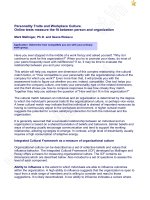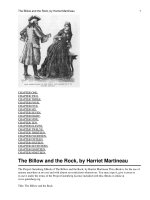Humor and Moroccan Culture pptx
Bạn đang xem bản rút gọn của tài liệu. Xem và tải ngay bản đầy đủ của tài liệu tại đây (388.37 KB, 120 trang )
1
Humor and
Moroccan
Culture
2 - Humor and Moroccan Culture
3
Humor and
Moroccan
Culture
By
Matthew Helmke
A look into the hidden aspects of
Moroccan culture that are necessary for
understanding local humor.
4
For more information about this book or to contact the author please write:
Derby & Wehttam · 263, rue Toufah · Hay Zaza · Fes · Morocco
Contents © 2007 Matthew Helmke
Cover art by Matthew Helmke and © 2007 Matthew Helmke
This work is licensed under the:
Creative Commons Attribution-NonCommercial-ShareAlike 3.0 License.
To view a copy of this license, visit:
or send a letter to
Creative Commons · 543 Howard Street, 5th Floor · San Francisco, California 94105 · USA.
Please see the “Final Notes and Thoughts” section at the end of the book for more information about
this licensing decision.
First edition, published 2007 by Matthew Helmke.
ISBN: 978-0-6151-4284-5
Printed and bound in the United States of America by Lulu, Inc.
A Moroccan edition is being prepared and will be published by Derby & Wehttam.
In plain text, this means that you are free:
● To Share: to copy, distribute, and transmit the work
● To Remix: to adapt the work
Under the following conditions:
● Attribution. You must attribute the work in the manner specified by the author or licensor ( but not in any way that
suggests that they endorse you or your use of the work).
● Noncommercial. You may not use this work for commercial purposes.
● Share Alike. If you alter, transform, or build upon this work, you may distribute the resulting work only under the
same or similar license to this one.
● For any reuse or distribution, you must make clear to others the license terms of this work.
● Any of these conditions can be waived if you get permission from the copyright holder.
5
Dedication
This book is dedicated
to my amazing wife, Heather, for her patience and
willingness to let me drag her all over the world on yet
another adventure.
to my wonderful children, Saralyn, Sedona, and Philip,
whom I love dearly and am more proud of than words can
possibly express.
and to my grandfather, Philip Derby, who always
believed in me and who always encouraged and supported
my endeavors, even in those times when he thought I was
wrong. Thank you for always letting me be me.
6 - Humor and Moroccan Culture
Acknowledgments
I would like to thank all my friends and colleagues who
helped me edit, fact-check and prepare this book for
publication. I sincerely hope I don't forget anyone. Thank
you Ouazzani Chahdi Mouhcine for helping me find
hundreds of great jokes in darija and for reading and
correcting my Arabic transcriptions. Thank you Steve
Jones, Mark Renfroe, and Doug Clark for reading my draft
manuscript and making incredibly useful comments during
the editing process.
I wish I could give credit to the people I interviewed
during the research for this book, but nearly all of them
wished to remain anonymous. So, I would like to thank all
of my friends, who have names like Driss, Mohamed,
Rabiaa, and Sanae, without whose openness and assistance
this book could not have been written.
7
I benefited greatly from my time studying Arabic in
Morocco at a school called DMG (arabophon.com) and I
recommend it highly, especially if you want to learn the
Moroccan dialect.
You might be interested to know that this book was
created and formatted using free software called Open
Office, available at openoffice.org, on a computer running
a free operating system called Ubuntu Linux, available at
www.ubuntu.com. The book was written and published
with the kind assistance of my small business in Morocco,
Derby & Wehttam, derbyandwehttam.com.
8
Table of Contents
Dedication 5
Acknowledgments 6
Preface 9
Being from Fez 15
I'm not sure that is Arabic 21
Always exceed expectations 27
Don't give me advice 33
Who are you going to trust? 40
I won't let you buy that 47
Respect is more important than truth 53
There's always a twist 64
Society's foundation 73
Your words don't matter 78
I'll do here what I did there 86
Who should I believe in? 92
Epilogue 100
Final notes and thoughts 106
Selected Bibliography 109
Fonts used 118
9
Preface
This book will explore and discuss the hidden
aspects of Moroccan culture, things that people who grow
up in Morocco seem to know inherently. I started on this
journey because of a joke. I was living in Casablanca at
the time and had been studying Arabic
1
. My friend
Mohamed told me a story and started laughing. He reached
1 The Moroccan variety called “darija.” This is an oral dialect that
is generally not written and therefore difficult to transcribe as
there are no standard spellings for words. The spellings I will be
using are my own and may actually vary from passage to
passage this is not by design, but it should serve to illustrate the
more fluid nature of darija. Pronunciations and grammar can
change regionally and even from family to family. I will explore
this more fully as the book continues.
10 - Humor and Moroccan Culture
his hand out to shake mine in a gesture that has now
become quite familiar—I like to call it the “we both
enjoyed that joke” handshake of congratulation and
friendship. As with most handshakes, it is followed by
putting your hand on your heart. Unlike other handshakes,
it is usually followed by all the parties discussing the joke
you just heard and why it was funny. This is to make
certain everyone understood it and can be included in the
fun. I found the experience enjoyable, even though I had
no clue what the joke was about. I was missing something
and I didn't know what it was.
I decided to do two things. First, I asked Mohamed
to explain the joke to me, line by line. After I learned all
the vocabulary and figured out what all the sentences
meant, I still didn't think the joke was funny. Mohamed
explained it to me, but I didn't understand his explanation.
I continued by asking him to explain how things would
have normally occurred in that situation and suddenly
something clicked. Here was an aspect of Moroccan
culture that I had been missing completely. Immediately
the joke made sense and I appreciated the humor of it.
The second thing I decided to do was birthed out of
11
that moment. I decided to ask people, everywhere I could,
to tell me jokes. Then I would struggle through each one,
trying to understand it, trying to figure out what made
each joke funny in its original context. This has led me on
a fun, and often difficult and overwhelming, journey of
cultural and linguistic study.
Once I had acquired a repertoire of 30 or 40 jokes in
Moroccan darija an expatriate friend asked me if I would
consider writing them down for him to study. I hadn't
thought of that earlier. Most of this still-growing
collection was made for my personal benefit and stemming
from my personality—I tell jokes all the time in my native
language and I love to use them to help make new friends
wherever I go. Jokes lighten the atmosphere and mood and
help lower defenses. This makes train rides, café visits,
and queues to pay the phone bill much more enjoyable.
I wasn't sure how a collection of jokes in Moroccan
darija by a foreigner would be received and was pretty
skeptical of the idea, so I shelved it for several years.
Occasionally, one of my friends among the expatriate
community in Morocco would ask me to tell them one of
the jokes they heard me laughing over with our mutual
12 - Humor and Moroccan Culture
Moroccan friends. I would oblige and translate the joke
into English for them. Invariably, the non-Moroccan
would not laugh. They wouldn't laugh even when I told it
in Moroccan Arabic and they knew every word. From
those moments I had an epiphany—you have to
understand the cultural tidbit behind any joke for it to be
funny. That brings us to the book you hold in your hands.
Each chapter of this book begins with a short story
in Moroccan Arabic. These stories were collected from
friends, in cafés, in offices, on trains and buses, and in
taxis, and even on the street. I have tried to transcribe them
as accurately as possible. I am not responsible for the
content of the stories, but any errors you may find in
transcription, or my sometimes loose translation, are fully
mine.
All of the discussion of culture which follows in
each chapter is completely mine. My thoughts and insights
are based on various interactions I have had with people
all over Morocco.
Much of what I state in these pages may come
across as authoritative. Please interpret this as a result of
my writing style and not my most heartfelt belief. My
13
greatest goal in writing this book is to help the reader
begin to ask the right questions when encountering
cultural differences and attempting to understand them.
Remember, the existence of a correlation between two
things does not prove or even imply causation. I make note
of many correlations and have hypothesized as to probable
causes for what I have witnessed. My hypotheses may be
wrong. In any case, I hope that noting the correlations and
describing them as best I can may help others to
investigate more fully.
All my research for this book has been correlational
and anecdotal in nature and never directive nor
experimental. I will leave that work for others more
qualified than I. In addition, I know that I sometimes
oversimplify when mentioning or describing the various
influences that bear on decisions and actions in this
culture. Human beings are complex and the things that
influence us are many. There may be motives and forces in
action beyond those that I describe. Please keep that in
mind. Look for those things, record them, learn from
them, and share them with others.
Finally, I realize that no culture is monolithic and
14 - Humor and Moroccan Culture
that the things I describe will not apply to all Moroccans
all of the time. In fact, the lion's share of my experience is
in Fez, so in some parts of the country my theories might
be completely wrong and utterly inapplicable. This has not
been intentional, and I have consciously tried to avoid
errors, but it's possible errors have crept in.
15
Being from Fez
!"#$%&'()*+,%'
$$ /00
$123456(708'699:
0;<=>0$;<3456972?5
7%,?1@>
There was a man walking through town with his son. They
met one of the father's friends and stopped to talk a bit.
The boy asked the man where he was from and he replied
that he was from Marrakech. After a short while they all
went their separate ways. The man said to his son, “Don't
ask people where they are from.” The boy replied, “Why?
That's a normal question.” The father answered, “If they
aren't from Fez they will be ashamed and if they are from
Fez they'll tell you all about it.”
16 - Humor and Moroccan Culture
Fez is an amazing city—just ask anyone who is
from there. I happen to live in Fez and I think it is a
wonderful place for a large number of reasons. As a
foreigner I can appreciate Fez's history, its contributions to
Moroccan culture, and its amazing food—which deserves
its reputation as some of the best Morocco has to offer. A
walking trip through the old city, the medina, is like taking
a trip back in time. You will see people living today in
much the same way as their ancestors did a thousand years
ago, except that today the traders are using their donkeys
to deliver Coca-Cola and butane gas cylinders to the
neighborhood shops instead of goat skin canteens and
freshly cut wood.
In the Fez medina, people buy and sell traditional
handicrafts such as fine leather, carved or inlaid wood, and
ornately etched or engraved metal. Visitors and tourists
explore streets and see homes and buildings that had
running water and a sewage system while Europe had yet
to emerge from the Dark Ages. One of the more
interesting places in Fez for a scholar/researcher is the
Qarawiyyin library which is said to be one of the oldest
continually used libraries in the world. It has works dating
17
back a thousand years or more and is a library that is still
used by students today.
Fez is the home of one of the oldest universities in
the world there seems to be a rivalry between the
Qarawiyyin university in Fez and Al Azhar in Cairo as to
which is older. Each claim the title and in some sense it
appears to be true for each of them. One (I forget which) is
said to have been founded earlier, but ceased operating for
a short time. I'm told the other started just a few years
later, but has never taken a break from teaching. Whether
these are facts or rumors, I'll leave the disagreement for
others to solve. Both universities are old and well-
respected.
Fez is considered the spiritual and intellectual
capital of Morocco. Its residents consider themselves,
perhaps rightly so, to be some of the best educated and
most sophisticated people in the country.
Fassis
1
are proud of the fact that no invaders were
ever able to enter the city walls and conquer the city. Fez
is a fiercely independent city that has historically held very
1 The name for a person from Fez is “fassi” much like someone
from Marrakesh would be called “marrakeshi” and so on.
18 - Humor and Moroccan Culture
strong opinions and great sway politically, religiously, and
culturally. In addition to being the unquestioned spiritual
capital of Morocco, it was also the first political capital
and the starting point for the independence movement,
which ended the French Protectorate era.
These are all important facts, and the reader must
realize that they will color everything that I write
throughout this text. I learned Arabic in Fez. I have gained
what understanding I have of Moroccan culture based
primarily on my years spent here in Fez among my Fassi
friends. I have chosen this joke as the first to tell because I
am certain if someone reads this book through the eyes of
their experiences or friends in Agadir or Tangier, they will
have a different perspective or understanding than I.
It's interesting to note that many Moroccans from
around the country seem to share the opinions of Fez that I
have acquired; that Fez is filled with people who act and
believe themselves to be more sophisticated than the
average Moroccan, that the history and culture of this city
is an old and proud one, and that the city's influence can be
felt throughout the country's history. If you were to ask
him, a local might tell you a hundred reasons why Fez is
19
an important city historically, culturally, artistically and
intellectually. In the next breath he would say that he is not
being arrogant, just accurate. Maybe he is right. In any
case, this is information that is vital to understanding
relationships among people in Morocco.
This trend goes farther than just Fez. Many of the
major cities in Morocco have their own special reputation.
Casablanca is known as the economic and manufacturing
capital of Morocco, Rabat is the French-influenced
political capital, Marrakesh is the capital of southern and
urban Berber culture, and on it goes. You also have
cultural and linguistic differences between people who live
in small towns and people who live in big cities, between
rural and urban cultures. There is a tension between
traditional Berber and traditional Arab ways of life
1
and
1 This is a tension that can be observed by watching people, but
one that will generally be denied by Moroccans. The prevailing
belief is that there are only Moroccans, that the Berber/Arab
dichotomy is unimportant. Amusingly, people who say this will
also tell you whether their family is of Arab or Berber descent
and often which tribe and geographic region they come from. I
think the unity is real in some ways and was necessary in the
20 - Humor and Moroccan Culture
another tension as each of way of life is being forced to
accept, or at least adapt to, Western ways of thinking and
doing things.
A person coming to Morocco for the first time often
asks an innocent question, “What is Morocco like?” The
answer isn't simple or easy. It depends on which aspect of
Morocco you are discussing; a specific family's structure,
the socio-economic status of the person you are
considering, the physical location, or setting of the
location you are interested in. There are many variables
and each one can have a major impact on the answer to the
question.
So, now you see why the Moroccan father in the
joke told his son not to ask where people are from. And,
like anyone from Fez, I have told you more than you
wanted to hear.
struggle for independence from the French Protectorate.
21
I'm not sure that is Arabic
1A!B-;C.1D!E=!F?1
G.7DHE&$G"HE&$6GI=8J.1#4D
B$7I!EHE6G#%D97KHHE08:HE6
9L%M7?1;!$2$6G&D!N9
GI%-&7I!EHE69HO5PHO15<
"HEGI!E$"HE)6I!7"E6G(7
7Q63,;!">03,45
(RI=B:1K,I%-DST%.D!N
L%MTED!N!::+=;DI%-
7:HE6G9BK.BTD!
There was a new teacher in the school and he wanted to
know all the kids' names. He asked and they began to
respond, “I'm Mouhcine. I'm Nazha.” One boy responded,
“I'm Asim.” The teacher looked at him and thought,
“That isn't a real name. What's going on here?” He asked
again and again the boy responded, “I'm Asim.” The
22 - Humor and Moroccan Culture
teacher thought a little more and told the boy, “No, your
name isn't 'Asim,' your name is 'Qasim.'” “That's what I
said,” repeated the boy, who was from the region of Fez
where they don't pronounce the letter “Q.” The teacher
told him that this is an important letter. To teach him to
pronounce his name correctly, he hit the boy until he said
it right. The teacher then looked at the frightened boy next
to him who replied, “I'm Qahmid.”
Where ever you go in Morocco you will discover
that no matter how good your Arabic is, it is not the same
as the people you are with. Dialects and accents can
change from one neighborhood to another, and certainly
from one city or region to another. Moroccan darija also
differs significantly from Modern Standard Arabic, also
known as Fous-ha.
The boy in the story is from a specific part of the
old city of Fez. In that area people tend not to pronounce
the letter “qoph” or perhaps substitute a “hamza”
1
in it's
place.
1 A glottal stop that sounds like an unvoiced “a,” like the sound
you make in English when you say “uh-oh.”
23
The teacher is from another part of Morocco, it
could be a different city or even just a newer part of Fez.
He doesn't speak with the same accent and had a hard time
understanding the boy. This is actually very common,
even for Moroccans traveling within their own country.
Just as an Englishman might have trouble understanding
an American from the Cajun parts of Louisiana, a
Moroccan from the rural Souss plain in the south might
have difficulty communicating with another from urban
Casablanca.
To get this joke you need one more vital bit of
information. The name Qasim is common enough for
people to know it well. In the region around of Fez many
would pronounce it just as the boy pronounced it, without
the first letter. The name Hamid is also common and
would start with the same sound as the boy's accent-
modified pronunciation of Qasim.
The second boy also grew up in the same part of Fez
and realized part of what was going on. He had not
traveled outside of the area and suddenly became afraid
that every word he had ever heard starting with a hamza
now needed a qoph. That would have included his name.
24 - Humor and Moroccan Culture
In an attempt to avoid a beating, the boy unnecessarily
adds the additional letter to his name, just like his friend
was forced to do.
I have found when traveling, that a person is not
considered an Arabic speaker unless he has learned the
local dialect. No matter how well you can read and write,
no matter whether you are able to speak beautiful, flowing,
classical Arabic, unless you can sit in a café and have a
casual conversation, you will not be considered an Arabic
speaker. Some allowance is made for travelers, say
someone from Rabat visiting Tangier. If you can make
yourself understood, that will be sufficient, even if your
pronunciation is very different.
It is for this reason I consider it useful to travel and
listen to different Moroccan accents when possible. I
attempt to adapt my speech when I am in a new area. I've
learned some interesting tidbits, but I know much more
remains before me.
In Fez and surrounding areas, an active verb is
indicated by a “k” sound at the beginning, preceding the
standard conjugation. In Rabat, this changes to a “t”
sound. In other places, no sound is attached at all.
25
For the letter used in the joke, Q – qoph, some
places will pronounce it deep in the throat like in Modern
Standard Arabic. Other areas will change it to a “g” or a
“â”
1
or even a “k” sound.
This is what makes transcribing darija so difficult. It
makes a joke told in one area and transcribed using
phonetic symbols quite difficult to comprehend for
someone who has learned darija in a different region.
Also of note, in Modern Standard Arabic you have
to be very careful when pronouncing a word. The careless
changing of one short vowel can render a completely
different meaning.
Moroccan darija bypasses this complication by
omitting short vowels much of the time. This causes the
language to sound very staccato and even harsh to the
untrained ear.
Moroccans can understand the Arabic from places
like the Middle East, but people from those regions
usually find Moroccan darija incomprehensible. One good
reason for this is that much of the media produced for the
1 U, or “ayen.”









